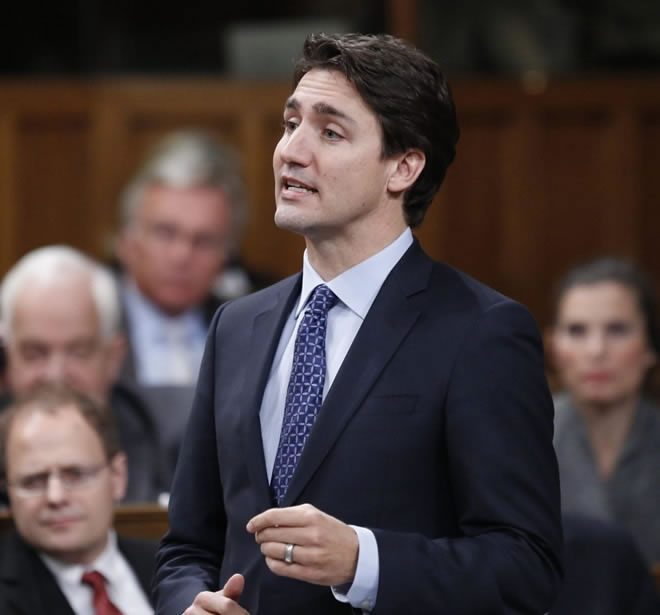
In a dramatic speech Tuesday evening, the leader of Canada’s Liberal Party, Justin Trudeau, criticized the Canadian government for its rhetoric over the threat of Islamist-related terrorism – and compared the country’s treatment of its Muslim minorities with restrictive policies against Jews prior to and during World War II.
Speaking in Toronto to alumni of McGill University, Trudeau, who will compete with Canadian Prime Minister Stephen Harper in an election later this year, discussed Canada’s idea of liberty. At one point, he listed a number of historical moments when his country had failed in that ideal, including the Chinese head tax (a fixed fee charged to every Chinese immigrant) and the internment of Ukrainian, Japanese and Italian Canadians during the world wars.
“When I talk to young people today about these episodes, they can hardly believe they happened. It doesn’t sound possible, not in Canada,” Trudeau told his audience. “So we should all shudder to hear the same rhetoric that led to a ‘none is too many’ immigration policy toward Jews in the 30s and 40s, being used to raise fears against Muslims today.”
Canada’s legacy of turning away Jewish refugees before and during World War II has become a source of shame for the country – Trudeau’s speech references the book “None is Too Many: Canada and the Jews of Europe 1933-1948” which documented how Canada did less that other Western countries for Europe’s Jews during this period, allowing only 5,000 Jewish refugees to enter the country.
The title of that book is itself a reference to an anecdotal comment by an immigration agency when asked how many Jews would be allowed into Canada after the war. Other stories of Canadian indifference to the Jewish plight abound. In one remarkable case, Canada turned away the St. Louis, a German ocean liner, carrying 907 European Jews. Those Jews later returned to Europe, where 254 are thought to have died in concentration camps. Some German and Austrian Jews were interned in Canada during World War II, accused of being “enemy aliens.”
In recent years, there has been a surge in immigrants from Muslim countries to Canada: 2011’s National Household Survey found that there were more than 1 million Muslims in Canada, over twice the number of Jews in the country and 3.2 percent of the total population (for comparison, in the United States, Muslims make up less than 1 percent of the population). A Pew Research Center estimate from the same year found that the population would surge to 2.6 million by 2030, a projected percentage increase of 183 percent.
Yet the rise in Canada’s Muslim population appears to have been mirrored by a rising suspicion of Muslims among Canadians. In 2014, one poll found that 54 percent of Canadians had a negative view of Islam. Matters were complicated last year by two attacks, inspired by Islamist extremism, that targeted Canadian soldiers, and by a number of Canadian citizens traveling to fight in the Middle East.
Trudeau accused Harper’s Conservative Party government of blurring the line “between a real security threat and simple prejudice.” In particular, he criticized the decision of a judge in Quebec to refuse the case of a Muslim woman who wore a hijab to court, arguing that it was a “troubling trend that Mr. Harper seems keen to accelerate and exploit” and linking it to the Conservative government’s proposed ban on the wearing of Islamic face veils during the oath of citizenship.
“It is a cruel joke to claim you are liberating people from oppression by dictating in law what they can and cannot wear,” Trudeau said.
Trudeau’s speech made headlines Tuesday in Canada, with a wide range of responses from the laudatory to the critical. Some noted that the speech made little mention of the Liberal Party’s own support for broad changes to national security legislation proposed by Harper’s government. Critics have claimed these changes are an infringement on the freedoms of Canadians (Trudeau has said his party supports the Anti-Terrorism Act 2015 but would try to amend it if it takes power this year). A spokesman for Harper defended the government’s treatment of Canada’s Muslim minority to Macleans, quoting a recent comment by Canada’s defense minister: “We stand in defense of the vast majority of Muslims who reject this cult of violence. Canadians are in solidarity with them.”
Among those looking in from the outside, however, many were struck by how rare it was to hear a mainstream politician making such a dramatic stand for Muslims. On Twitter, Glenn Greenwald of the Intercept praised Trudeau’s comments, saying they were “inconceivable for leading US politician.”































